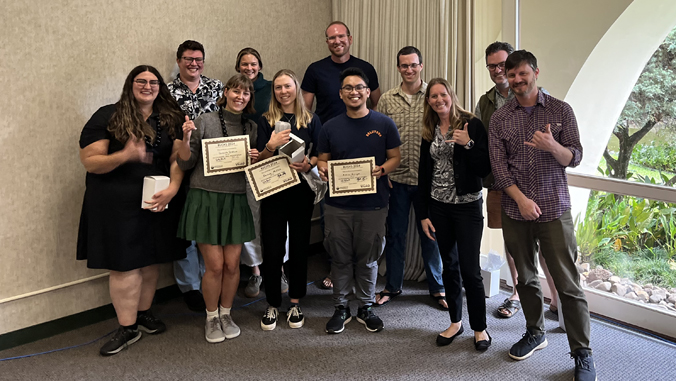
A two-day symposium offering professional and personal development opportunities was organized by oceanography graduate students, Victoria Assad and Liz Miller, and hosted by the University of Hawaiʻi at Mānoa Department of Oceanography and the Uehiro Center for the Advancement of Oceanography. The Breakthroughs: Uehiro and Oceanography Yearly Symposium included students sharing their latest research and discoveries, a career panel, and community-building workshop centered around how the brain experiences grief in March.
Graduate students presented research talks covering novel research methods, ecology in coral reefs and the deep sea, human impact on coastal ecosystems, and physical, chemical and biological dynamics in the open ocean. Undergraduate students from the Global Environmental Science program presented their research in a poster session for the attendees which included researchers, faculty and students.
Showcasing career pathways
Professional development officers of the oceanography graduate student organization Nā Kama Kai, Christina Comfort and Kyle Conner, organized a careers workshop. They facilitated a discussion on opportunities beyond academia for marine scientists with a panel of people including researchers and administrators in academia, government agencies and non-profit organizations.
“I think the most important part of these types of panels is normalizing wiggly career paths,” said oceanography graduate student Gabrielle Stedman. “It is important for students to be reassured that they are in the right place and there is no such thing as an ‘efficient’ career path.”
Connecting through a common loss
Assad and Stedman had been friends and colleagues for several years and after they each lost their fathers—Assad’s in May 2022 and Stedman’s in December 2023—the two connected on a deeper level.
“Gabby reached out to me to learn how to navigate this and the grief process, and I recommended the book The Grieving Brain by Mary Frances O’Connor, which comes at grief from a neuroscience perspective,” said Assad. “I really could have benefitted from knowing earlier on what is detailed in the book—that grief isn’t as simple as five stages and is a continual process of re-wiring expectations—and learning why my brain was processing or changing the way it was.”
The two students decided they wanted to share this information with the rest of the department during the community workshop at the symposium.
“I not only heard from Victoria about her grief, but in reaching out for help, I learned of at least five other students around me who had experienced intense grief in graduate school,” said Stedman. “I was pretty shocked by how common grief is and felt it was important for graduate students and the greater department to make space for these conversations.”
For more information, see the School of Ocean and Earth Science and Technology’s website.
–By Marcie Grabowski

